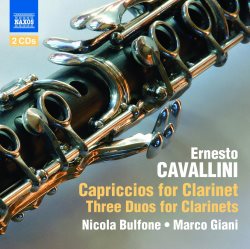| 
|
Ernesto CAVALLINI (1807-1874)
30 Capriccios for Clarinet: Nos. 1-30 (pub. 1904) [110:28]
Three Duos for Clarinets (1836) [44:59]
Nicola Bulfone (clarinet), Marco Giani (clarinet acc. for Three Duos)
rec. August 2005 (capriccios), Auditorium Bratuz, Gorizia, Italy; and October 2012 (duos), Fraferu’s Studio, Tricesimo, Italy
NAXOS 8.573133-34 [78:19 + 77:08]
Described in the Gazzetta Musicale di Milano as the ‘Paganini of the clarinet’ and by L’Italia musicale as the ‘Liszt of the clarinet’, Italian clarinettist and composer Ernesto Cavallini’s compositions are tremendously exciting. This sense of eagerness and delight is in part due to Nicola Bulfone’s astonishing virtuosity in the 30 Capriccios. Like Cavallini, Bulfone’s tone is soft and his breathing is almost indistinguishable.
Split across two discs, the Capriccios are like a sprawling mass of tightly packaged gems. The word ‘capriccio’ itself denotes a sudden change of mind, derived from the Italian meaning ‘head with the hair standing on end - influenced by capra ‘goat’, associated with sudden starting movements - from capo ‘head’ and riccio ‘hedgehog’. The word and the music are frisky and lively.
The use of arpeggio in No. 3 in C minor recalls Bach’s Prelude to his Cello Suite No. 1 and it is surely irrefutable that No. 6 in D major was a source of inspiration for Prokofiev’s cat. Similarly, the opening of No. 23 in E minor mirrors that of Bach’s Toccata and Fugue in D minor and flourishes into an enticingly rich series of diversions. No. 8 in F major is rather like an exercise in scales; through this pattern Bulfone demonstrates his ease and ability to charm, rather than sounding as if he were in a practise room. With masterful technical skill and focus, Bulfone’s rich, velvety tone is exemplified through the middle register of the clarinet in No. 10 in A minor. Beginning and ending in a spacious and songlike vein, No. 13 in G major is spiced with a mischievous staccato middle section expertly played.
The Capriccios on the second CD are generally longer and contain more intricate and shifting rhythms. In No. 15 in C major cascading scales in C major evoke the image of Arshile Gorky’s Waterfall painted in 1943 where morphing shapes and liquid drips of paint resemble the fluidity of a waterfall. No. 17 in A minor sounds rather like Klezmer and certainly has more of an Eastern European than Italianate nature. This is a fascinating piece; Bulfone is excellent at bringing out an array of colours. Recorded with fantastic audio quality, these Capriccios belong to an altogether highly polished album.
Accompanied by his top-mark scoring student Marco Giani - he was awarded his clarinet diploma with top marks and honours in Bulfone’s class - Bulfone’s performances of Cavallini’s Three Duos for Clarinets are world premiere recordings. Originally written in 1836 and dedicated to Cavallini’s brother Pompeo, Alessandro Rolla’s duos for violin and cello come to mind as a source of inspiration and comparison. Like the Capriccios, these pieces were composed for teaching purposes. However, Bulfone and Giani remove that sense of rigorous and tiresome practise to render these pieces interesting with elements of elegant Italian bel canto and lively musical conversation. Consisting of only two movements - the first and third duos both contain three movements - Duo No. 2 in A minor is an intriguing work. Bulfone and Giani are seamless as they interweave and corroborate rhythmically and dynamically; their timing and togetherness is brilliant. Being so technically masterful, these virtuosos play with added sensitivity and humility to produce results that are carefully crafted and neatly shaped. The second movement (tempo di romanza) of No. 3 in B flat major opens tenderly and its recurring theme and digression are played affectionately.
Praise for Cavallini is extensive as he was admired by both Rossini and Verdi. Whilst at La Scala, Cavallini performed in four Verdi premieres. Indeed, Verdi composed the clarinet solo of the prelude to the third act of La Forza del Destino specifically for him. Both as a composer and performer, he is to the clarinet what Mercadante is to the flute; a composer who manages to blend immensely imaginative originality with traditional themes and structures.
On this recording, Bulfone is daring, outgoing and always utterly attentive to the character of the music.
Lucy Jeffery
 |
 |
|











